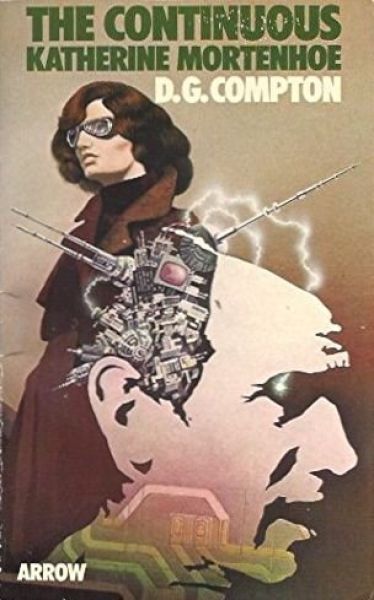Every Single Day
The Continuous Katherine Mortenhoe
By D. G. Compton

16 Jun, 2019
D. G. Compton’s 1974 The Continuous Katherine Mortenhoe (also published as The Unsleeping Eye) is a near-future SF novel.
Katherine Mortenhoe is a forty-four-year-old woman whose computer skills have won her a minor niche in publishing. She’s settled for a humdrum marriage that is only marginally superior to solitude. She has led an unremarkable life.
She learns that she has just four weeks to live. In the world of this novel, premature death is extremely rare, She has become a valuable media commodity.
She is surprised to be asked to visit her doctor. She learns that she has a neurological disorder that will kill her swiftly. Nothing can be done, save giving her palliative drugs.
Katherine’s doctor is not entirely on her side. He has let her diagnosis leak out the press, which is anxious to give her decline and death a full-court press. It will be a riveting spectacle. Audiences will be large. $$$!!!
Roddie is a cyborg with a television camera eye and no need to sleep. A documentary series, Human Destiny, has charged him to document Katherine’s wretched final days. First he must get her to agree to the filming.
But Katherine has no desire to spend her last month displayed as a pitiful freak for television audiences. Money and fame do not tempt her. However… she has very little idea of how she does want to spend her last days.
~oOo~
1970s British science fiction had a reputation as gray and dreary, offering morose visions of futures in which moral compromise was inescapable. I would suppose that authors imagined dour futures because the 1970s UK was a dour place. It was a post-imperial nation all too aware of decline, struggling with labour unrest and economic disruptions. Then came Thatcher.
This book doesn’t challenge the stereotype. Technological advances have not fundamentally improved life; people work at meaningless jobs to eke out marginal livings. If they are lucky, they survive long enough to die of old age. People tolerate disappointing spouses because they fear solitude. The skies are habitually overcast. Cold drizzles fall. Woe woe woe. Now I ask you: is that such an implausible future?
The plot imagines new tech that seems implausible: camera eyes, no more disease, no need to sleep. But one consequence of these developments (a voyeuristic society with no regard for privacy) is all too plausible. It’s a simple extrapolation from television.
Compton’s profoundly alienated characters are not always likeable (generally, they don’t even like themselves) but they are prickly and obstinate in believable and relatable ways. A lot of 1970s fiction hasn’t aged very well, but this book is just as solid as it was back in 1974. Just don’t pick it up expecting a comfort read.
The Continuous Katherine Mortenhoe is available here (Amazon), here (Amazon.ca) and here (Chapters-Indigo).
